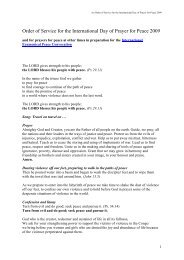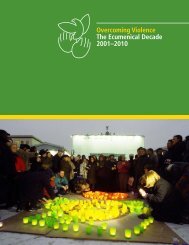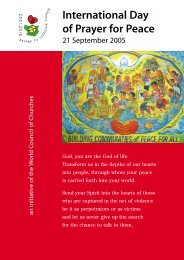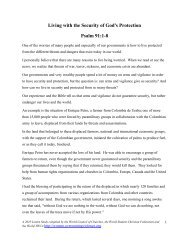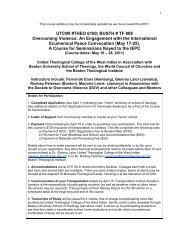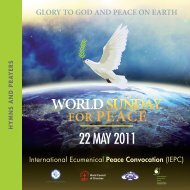Alternative Globalization Addressing Peoples and Earth
Alternative Globalization Addressing Peoples and Earth
Alternative Globalization Addressing Peoples and Earth
Create successful ePaper yourself
Turn your PDF publications into a flip-book with our unique Google optimized e-Paper software.
We, churches <strong>and</strong> believers, are called to look at the world’s reality from<br />
the perspective of people, especially the oppressed <strong>and</strong> the excluded.<br />
We are called to be non-conformist <strong>and</strong> transformative communities. We<br />
are called to let ourselves be transformed by the freeing our minds from<br />
the dominating, conquering <strong>and</strong> egoistic imperial mindset, thus doing the<br />
will of God (according to the Torah) which is fulfilled in love (agape) <strong>and</strong><br />
solidarity (Romans 13:10, 1 John 3, 10-24). Transformative communities<br />
are transformed by God’s loving grace. They practice an economy of<br />
solidarity <strong>and</strong> sharing.<br />
Paul’s good news is that, in the face of today’s principalities <strong>and</strong> powers,<br />
another world is possible. Christian traditions, together with wisdom in<br />
other religions <strong>and</strong> cultures, can contribute to this vision of life in just<br />
relationships realized by God’s Spirit, <strong>and</strong> can offer inspirational visions<br />
for alternatives.<br />
We as churches are called to create spaces for, <strong>and</strong> become agents of,<br />
transformation even as we are entangled in <strong>and</strong> complicit with the very<br />
system we are called to change.<br />
We witness the massive violation of the human dignity <strong>and</strong> the integrity<br />
of creation. We confront the suffering, enormous economic <strong>and</strong> social<br />
disparity, abject poverty <strong>and</strong> the destruction of life, which result from the<br />
neoliberal model of economic globalization. As churches, we need to accept<br />
<strong>and</strong> assume the vocation to challenge the thinking of the present age, to<br />
be transformed ourselves by God’s grace, <strong>and</strong> to boldly develop visionary<br />
long-term strategies. It is a pastoral <strong>and</strong> spiritual task for the churches to<br />
address the false spirituality of conformity, <strong>and</strong> to encourage Christian<br />
believers <strong>and</strong> faith communities to embrace a spirituality of life <strong>and</strong><br />
transformation rooted in God’s loving grace. This is the way in which<br />
agape, the love of God <strong>and</strong> neighbour, is translated into social <strong>and</strong> economic<br />
life.<br />
We are called to be with the suffering people <strong>and</strong> groaning creation in<br />
solidarity with those who are building alternative communities of life. The<br />
locus of the churches is where God is working, Christ is suffering <strong>and</strong> the<br />
Spirit is caring for life <strong>and</strong> resisting destructive principalities <strong>and</strong> powers.<br />
The churches that hold themselves apart from this concrete locus of the<br />
Triune God cannot claim to be faithful churches.<br />
In the context of neoliberal globalization, churches are called to make<br />
an explicit <strong>and</strong> public commitment of faith in word <strong>and</strong> deed. Ways in<br />
which the churches can express their faithfulness are by:<br />
• Opting for costly discipleship, preparing to become martyrs by<br />
following Jesus;<br />
5




